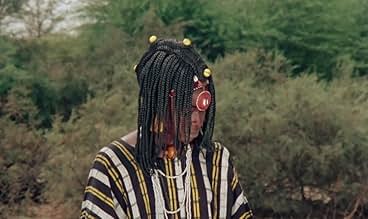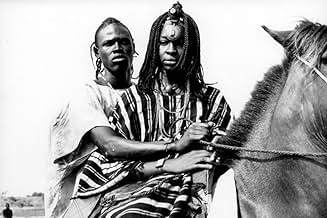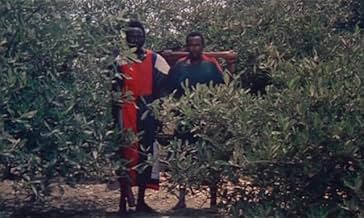IMDb-BEWERTUNG
6,6/10
1257
IHRE BEWERTUNG
Füge eine Handlung in deiner Sprache hinzuIn protest of forced conversion to Islam, the Ceddo (outsiders) kidnap King Demba War's daughter Princess Dior Yacine and hold her hostage.In protest of forced conversion to Islam, the Ceddo (outsiders) kidnap King Demba War's daughter Princess Dior Yacine and hold her hostage.In protest of forced conversion to Islam, the Ceddo (outsiders) kidnap King Demba War's daughter Princess Dior Yacine and hold her hostage.
- Regie
- Drehbuch
- Hauptbesetzung
- Auszeichnungen
- 1 Gewinn & 1 Nominierung insgesamt
Tabata Ndiaye
- Princess Dior Yacine
- (as Tabara Ndiaye)
Ismaila Diagne
- The Ceddo Kidnapper
- (as Mamadou N'Diaye Diagne)
Mamadou Dioumé
- Prince Biram Ngone Thioub
- (as Mamadou Dioum)
Omar Gueye
- Jaraaf the King's Mediator
- (as Oumar Gueye)
Empfohlene Bewertungen
10Rigor
The Great novelist and filmmaker Ousmane Sembene create a complex text about the early colonialization and enslavement of African people. A searing critique of "pre-european" colonization and exploitation. The film is a must see for anyone interested in the art of cinema and/or the politics of liberation.
The period depicted in Senegal's history is the 1860's, when to help resist French colonialism, several leaders converted to Islam - for example, Lat Jor, in the part of Senegal that was the state of Cayor in 1861. Over the century which followed, culminating in Senegal achieving independence from France in 1960, Islam would become firmly established, but what's fascinating about this film is that director Ousmane Sembène shows it as just another set of doctrines imposed from the outside. The term ceddo can mean a lot of things and is quite layered/complex (far beyond my expertise and the scope of a film review), but here we see it applied to the common people who follow timeless traditional customs, including the worship of their own idols. When they are forced to convert or be killed, a few of them kidnap the king's daughter in the attempt to resist, and that forms the basis for the story.
The film reveals the flaw in monarchical rule, where one man makes decisions, and in this case, all the more so when he converts to Islam. He then faces a power struggle with the imam, and we see one of the most insidious aspects of religion, that it's often less about spiritual enlightenment, and more about the assertion of power over common people, who simply wish to be left alone. It's for these reasons (and not a politicized spelling variation of the word 'ceddo') that got the film banned for eight years by Senegal's president, Léopold Sédar Senghor, who was up for election in 1978 after the reestablishment of a multi-party system in 1976.
The film also shows the declining power of Christianity in the form of a priest who doesn't speak a single line in the film, and who is reduced to fantasizing over a larger congregation. There is also a French slave trader, who while also mute and somewhat in the background, still exerts cruel power, as all factions involved trade human beings with him for material goods, like food or weapons. It's one of the disturbing aspects of the slave trade, the complicity of Africans against fellow Africans, and it's tough to see.
I loved the basis for the story, as well as getting a glimpse into Senegalese customs and traditional clothing (among other things, the hats are pretty wild). Their traditional way of debating apparently includes great politeness, and speaking through a third party even though everyone is present. The third party repeats messages with fanfare and also talks up the important speakers, as if he were some kind of promoter. They also dole out amusing lines like "A man who wears trousers full of fat should not approach the fire."
Unfortunately, the film has a pace that's way too slow for its pretty simple story, making it a bit of a slog to get through. For a film of this length, I would have liked to have seen much more of the context for the events we see, as there is plenty of complexity in the historical events that could have been mined, and for these characters to have been developed. Alternatively, it could have been pared down to be much shorter.
While the colors are vibrant and Sembène transported me to this world which is cool in and of itself, I have to say, the production value was not particularly high. I can forgive it for the uneven acting (though the actor playing the Imam is quite good), but the soundtrack featuring 70's music was an odd choice. It appears as though some animals may have been burned alive when a portion of a village is burned down as well. The actress playing the King's daughter (Tabata Ndiaye) is beautiful but her toplessness towards the end seemed a little gratuitous, starting with a too-convenient swim. At least she's a strong character, and I liked her role in the ending.
All in all, this is a film I liked more for the concept and for the doorway it provided me to researching this bit of history, than I liked the film itself, which is a shame.
The film reveals the flaw in monarchical rule, where one man makes decisions, and in this case, all the more so when he converts to Islam. He then faces a power struggle with the imam, and we see one of the most insidious aspects of religion, that it's often less about spiritual enlightenment, and more about the assertion of power over common people, who simply wish to be left alone. It's for these reasons (and not a politicized spelling variation of the word 'ceddo') that got the film banned for eight years by Senegal's president, Léopold Sédar Senghor, who was up for election in 1978 after the reestablishment of a multi-party system in 1976.
The film also shows the declining power of Christianity in the form of a priest who doesn't speak a single line in the film, and who is reduced to fantasizing over a larger congregation. There is also a French slave trader, who while also mute and somewhat in the background, still exerts cruel power, as all factions involved trade human beings with him for material goods, like food or weapons. It's one of the disturbing aspects of the slave trade, the complicity of Africans against fellow Africans, and it's tough to see.
I loved the basis for the story, as well as getting a glimpse into Senegalese customs and traditional clothing (among other things, the hats are pretty wild). Their traditional way of debating apparently includes great politeness, and speaking through a third party even though everyone is present. The third party repeats messages with fanfare and also talks up the important speakers, as if he were some kind of promoter. They also dole out amusing lines like "A man who wears trousers full of fat should not approach the fire."
Unfortunately, the film has a pace that's way too slow for its pretty simple story, making it a bit of a slog to get through. For a film of this length, I would have liked to have seen much more of the context for the events we see, as there is plenty of complexity in the historical events that could have been mined, and for these characters to have been developed. Alternatively, it could have been pared down to be much shorter.
While the colors are vibrant and Sembène transported me to this world which is cool in and of itself, I have to say, the production value was not particularly high. I can forgive it for the uneven acting (though the actor playing the Imam is quite good), but the soundtrack featuring 70's music was an odd choice. It appears as though some animals may have been burned alive when a portion of a village is burned down as well. The actress playing the King's daughter (Tabata Ndiaye) is beautiful but her toplessness towards the end seemed a little gratuitous, starting with a too-convenient swim. At least she's a strong character, and I liked her role in the ending.
All in all, this is a film I liked more for the concept and for the doorway it provided me to researching this bit of history, than I liked the film itself, which is a shame.
Ceddo is one of the first films to come out of Africa (it was promptly banned in Senegal). It contains both subtle and not-so-subtle political messages in the conversations of characters fighting to keep their traditional way of life. The film holds a wealth of information that the casual eye might not catch. Linguists and other language buffs will enjoy the form and styles of speech (no one speaks directly to those of higher class, a major form of communicating ideas is to use metaphorical sayings, etc.). Those fascinated by culture will notice the myriad customs that might go unnoticed to other viewers. It is a film of revolt! Highly recomended.
An interesting picture, though a tad slow. Three cultures, the ceddo, the Christians and the Muslims are tensely struggling for power in rural Africa. The ceddo (which means "outsider") have kidnapped the king's daughter because they are sick of having to kowtow to the power-hungry imam (the film is surprisingly unkind toward Islam, and was actually banned for that reason in Sembene's native Senegal). I loved the colors and the music. The story is good, but there are a few too many sequences of the characters sitting around debating the various merits of their religions (which amounts to, "If you don't believe what I believe, you're going to Hell!"). That stuff gets old quick.
It's some time .... well, it looks like it's early 19th century, but there are lots of outliers in garb. There are new folks around, and the slave-traders, Christians and a short Muslim imam are competing for dominance. The king has turned Muslim and orders everyone to convert, but the Ceddo, traditionalist animists not only resist, but kidnap the royal princess. There's a council in which claimants argue over who gets to rescue her, but the guy guarding her has no problem with them.
It was banned by Senegal because it wasn't respectful of Islam. To my eye, it didn't like anyone.
It's a little slow, although whether because director Sembene had a lot of things to say and felt a need to pound them into the audience, or because he wished his audience to be annoyed with all his characters, I cannot say. Sembene directs this one with a strong composition. In my review of his earlier SEMITAI, I noted that his compositions were loose, more groupings by color than framing. With this movie, he moves in the opposite direction, rarely using the entire frame, but clearly marking off the portion he wanted to use.
It was banned by Senegal because it wasn't respectful of Islam. To my eye, it didn't like anyone.
It's a little slow, although whether because director Sembene had a lot of things to say and felt a need to pound them into the audience, or because he wished his audience to be annoyed with all his characters, I cannot say. Sembene directs this one with a strong composition. In my review of his earlier SEMITAI, I noted that his compositions were loose, more groupings by color than framing. With this movie, he moves in the opposite direction, rarely using the entire frame, but clearly marking off the portion he wanted to use.
Wusstest du schon
- WissenswertesBanned by the Senegalese government for several years, likely for the unflattering portrayal of Islam. The official reason given was that the title was incorrectly spelled in a European fashion.
- PatzerThe action sets at the end of seventeenth century but the umbrella over the imam, when he is on the throne, is clearly contemporary.
- SoundtracksChoir
(in Diola language)
Interpreted by Chorale Saint Joseph de Cluny - Dakar
Conducted by Julien Juga
Top-Auswahl
Melde dich zum Bewerten an und greife auf die Watchlist für personalisierte Empfehlungen zu.
- How long is Outsiders?Powered by Alexa
Details
Zu dieser Seite beitragen
Bearbeitung vorschlagen oder fehlenden Inhalt hinzufügen
















